Australian Garden History, the Society’s journal, was first published in 1989. It has continued as it started, striving to maintain a dialogue between professional and amateur interests in the history of gardens, thus showcasing the many aspects of the landscape and its intersection with Australian life.
Media Releases
March 2025 - Ways of seeing landscape
December 2024 - Garden transmissions
September 2024 - People and plants
July 2024 - Restoring and recording gardens
March 2024 - Lest we forget
December 2023 - Déjà vu: recurring themes in gardens and landscape history
September 2023 - Highlighting design
June 2023 - Celebrating camellias
March 2023 - From Gondwana to mid-20th century modern
January 2023 - The diverse histories of gardens
September 2022 - Knowing our landscape
June 2022 - Collating the past
March 2022 - The flow of ideas
6 January 2022 - Against the odds
20 September 2021 - Being seen to conserve
1 June 2021 - A picture is worth a thousand words
31 March 2021 - Dare to dream
5 January 2021 - Gardens are great
16 September 2020 - How gardens and landscape shape our identity
13 August 2020 - Gardens and their history offer solace during COVID-19
Indices of Journal Articles
The index to Australian Garden History makes it easy to find articles, gardens and other gems contained in volumes 1–20.
Compiled by AGHS member Kirstie McRobert, this comprehensive index covers issues of the Australian Garden History Journal from 1989-2009.
Download:
Australian Garden History Index, Volumes 1–20 — Australian Garden History Society.
For a limited search of online journal extracts, enter a word of interest here ...
Donate to the Nina Crone Writing Fund
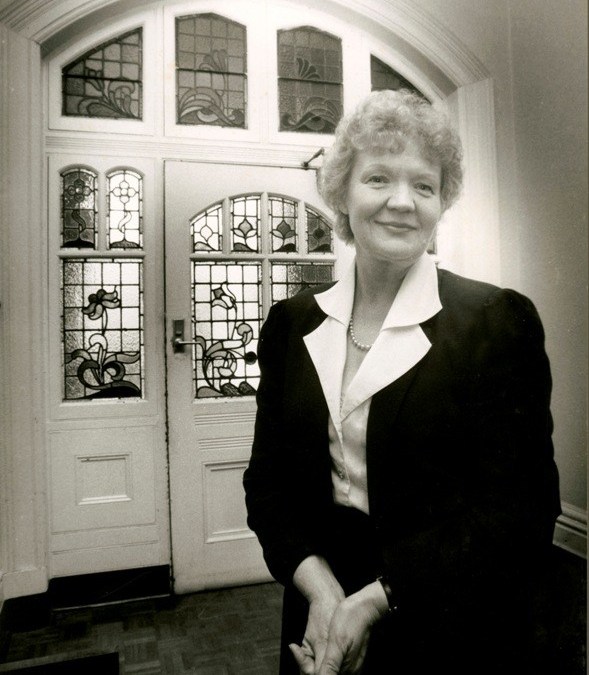 If you would like to encourage new writing talent and promote interest in garden history by donating to the Nina Crone Writing Fund, please click here for details.
If you would like to encourage new writing talent and promote interest in garden history by donating to the Nina Crone Writing Fund, please click here for details.
History of the Journal
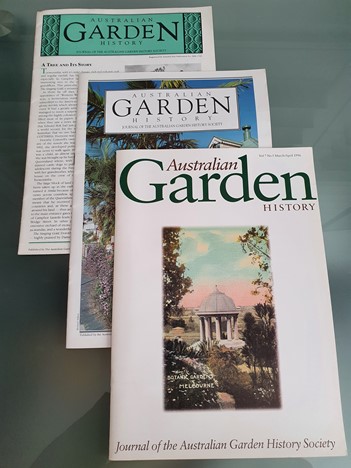 Nancy Clarke, AGHS ACT Monaro Riverina Branch, sets out the history of Australian Garden History in this paper,
Nancy Clarke, AGHS ACT Monaro Riverina Branch, sets out the history of Australian Garden History in this paper,
The Australian Garden History Society journals
Getting Published in the Journal
Guidelines for submission to Australian Garden History Journal
Copy deadlines for article submission to Australian Garden History Journal
| January issue | end of October |
|---|---|
| April issue | end of January |
| July issue | end of April |
| October issue | end of July |
Authors: please note that planning for future issues takes place well before these deadlines. You are advised to contact the editor as early as possible about your intention to submit.
Advertise in the Journal
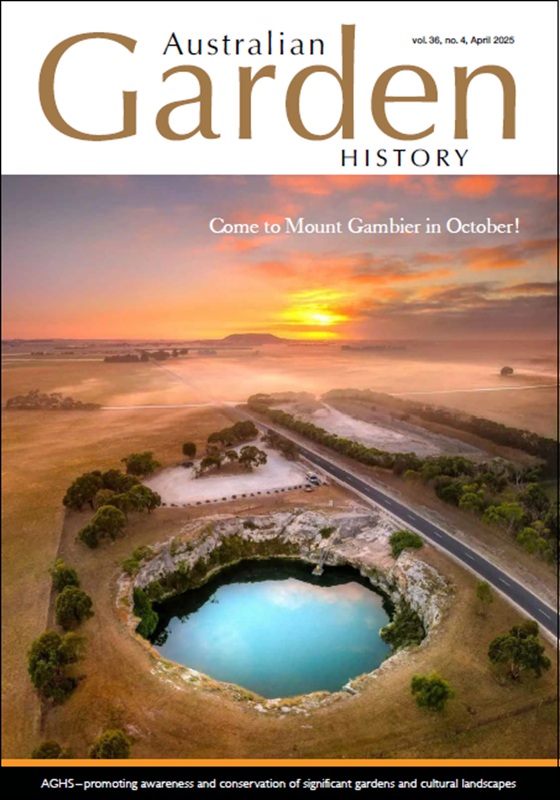
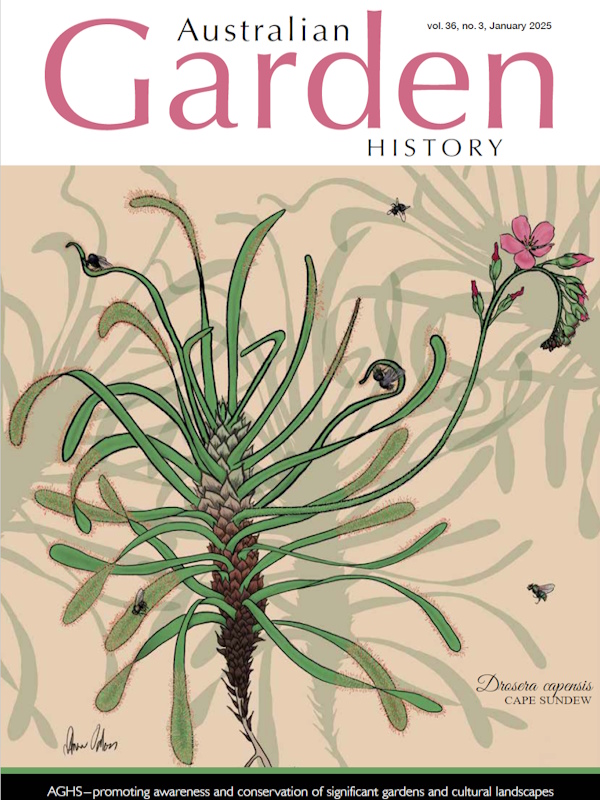
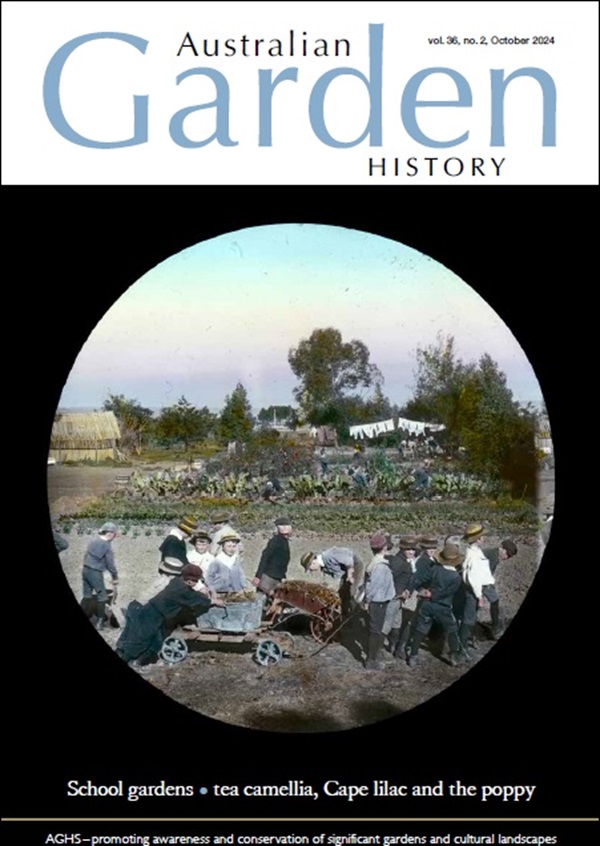
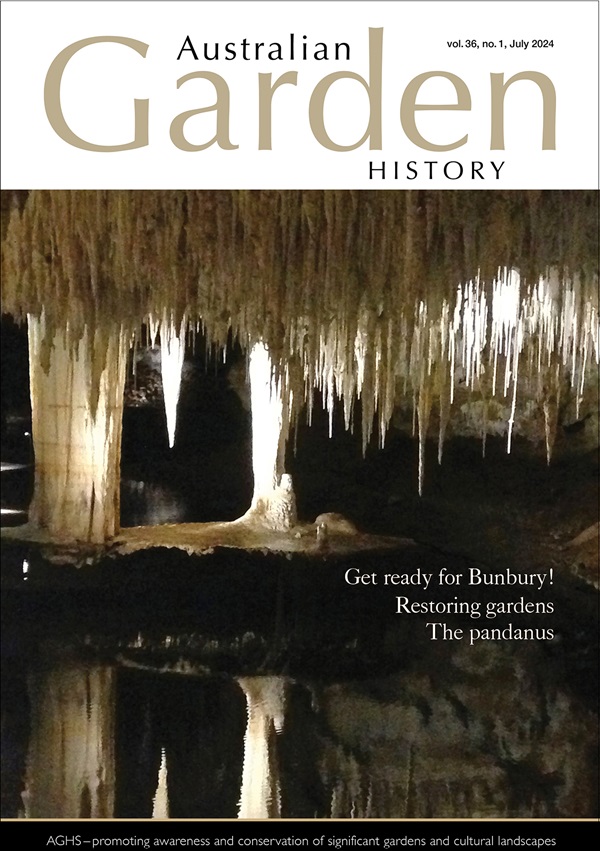
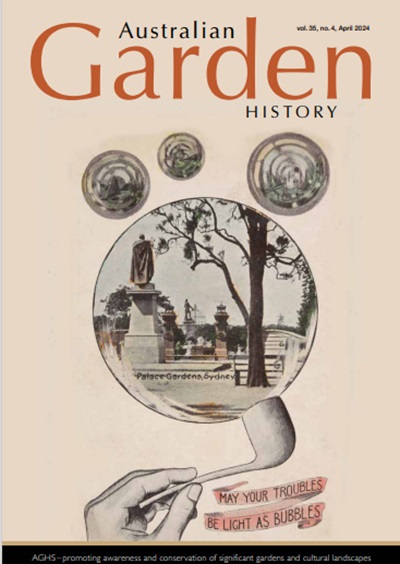
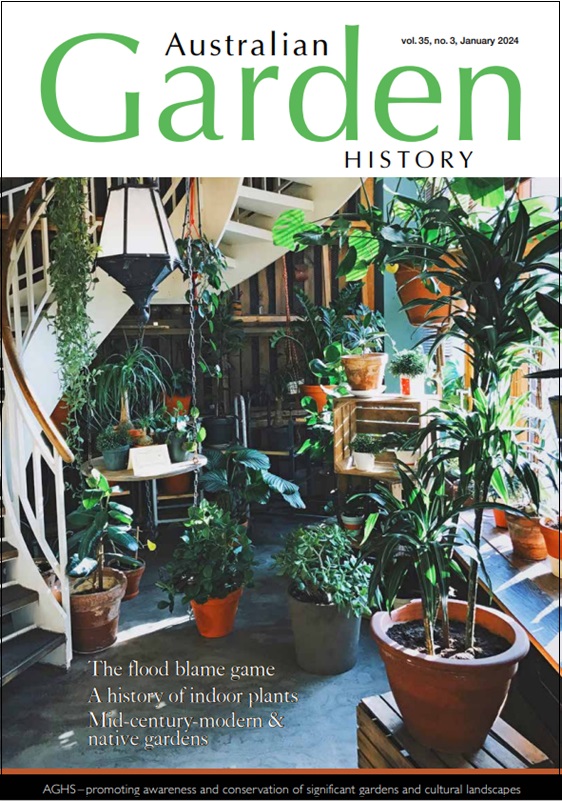
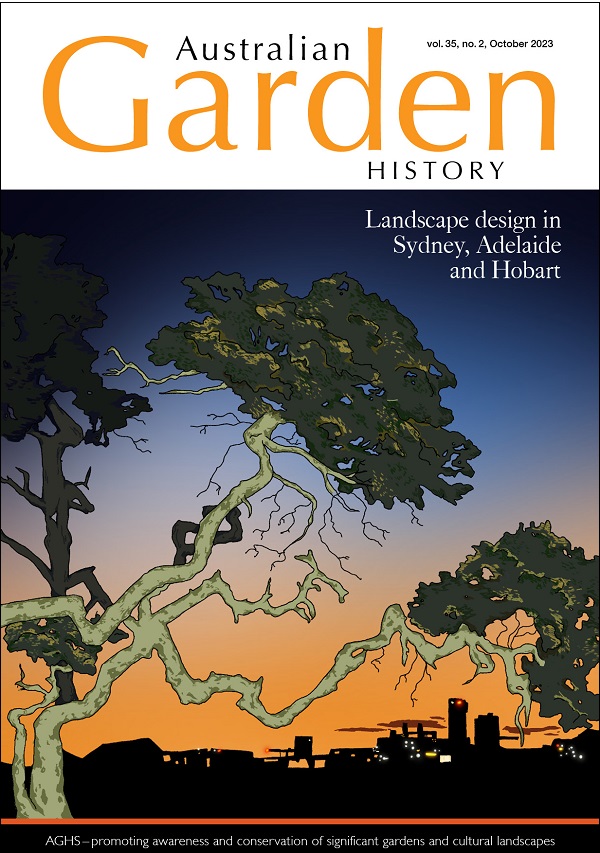
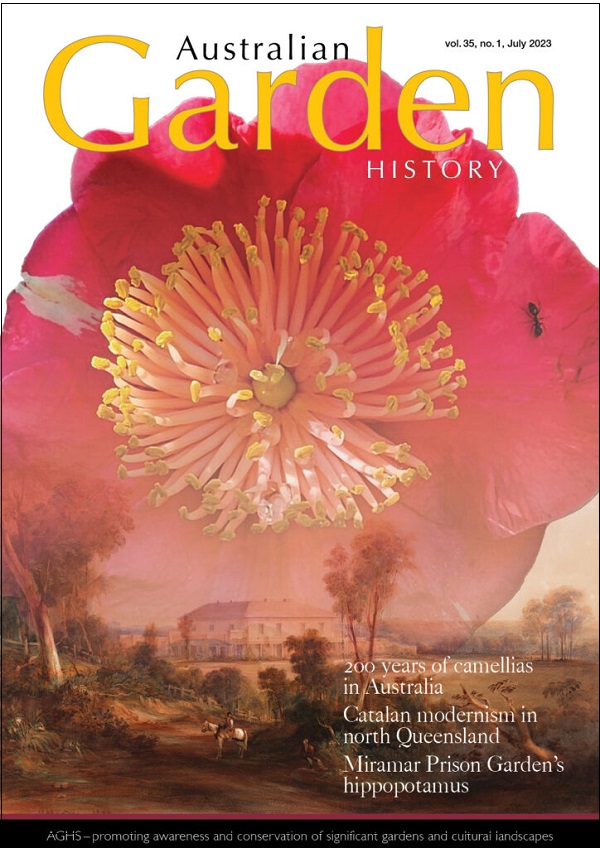
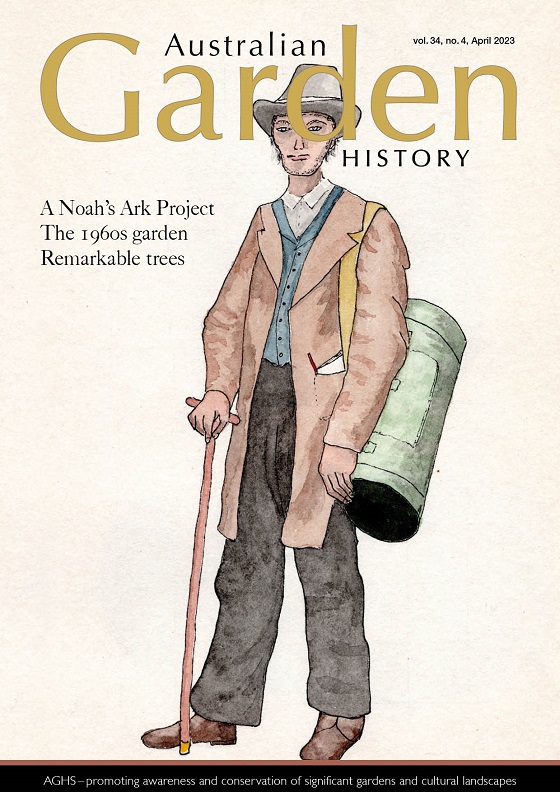
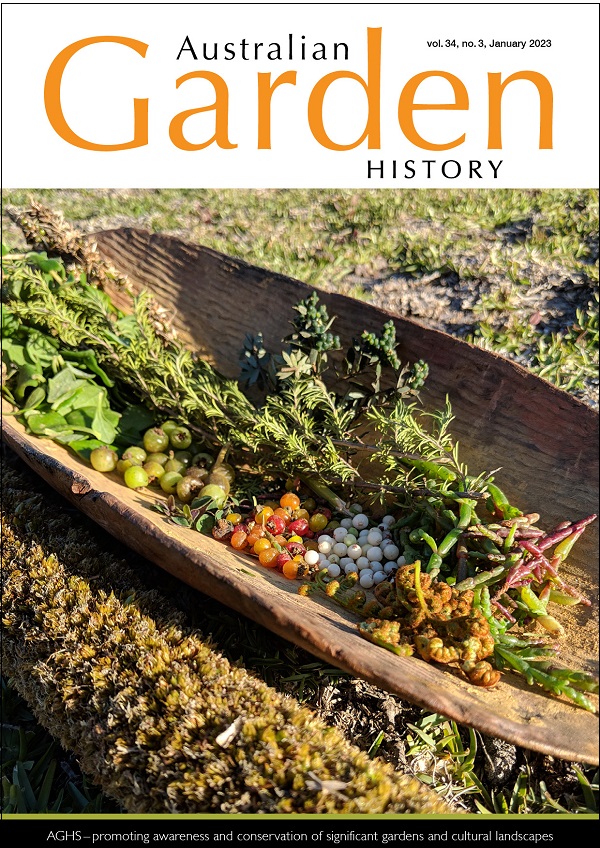
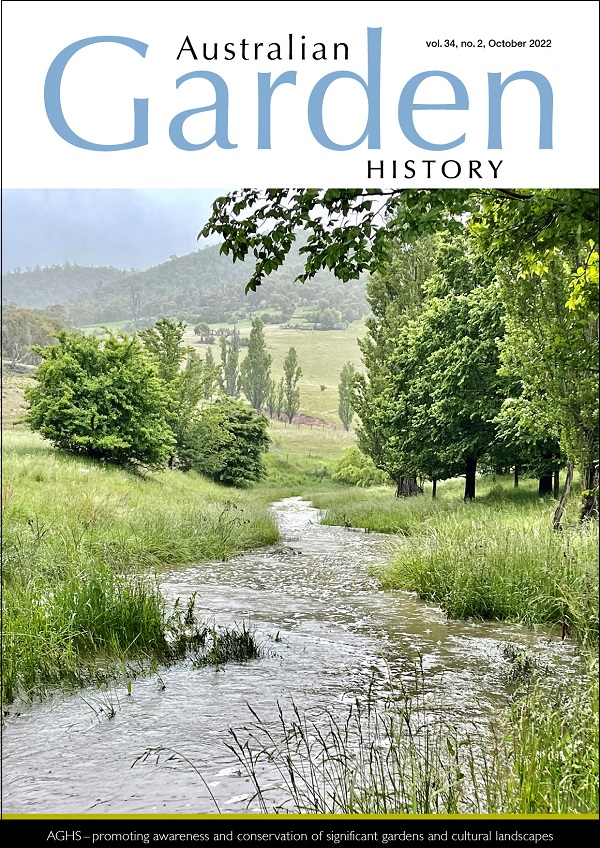
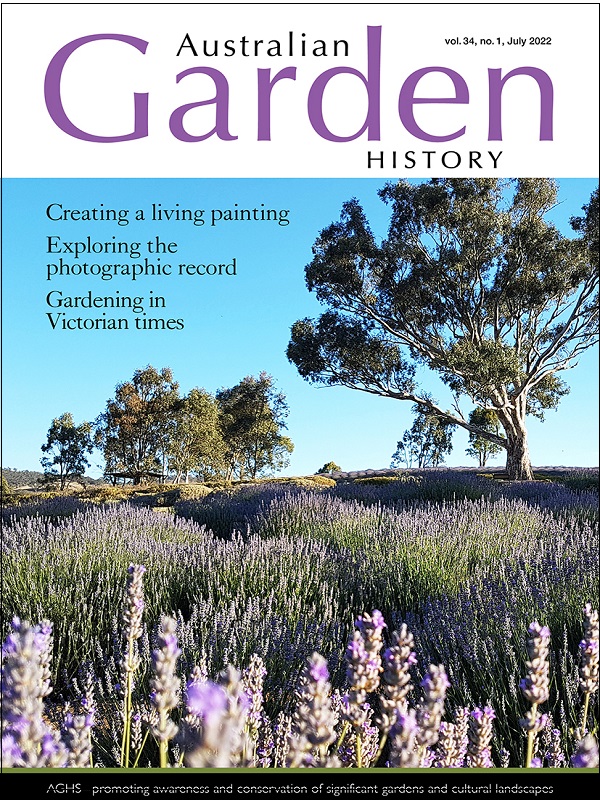
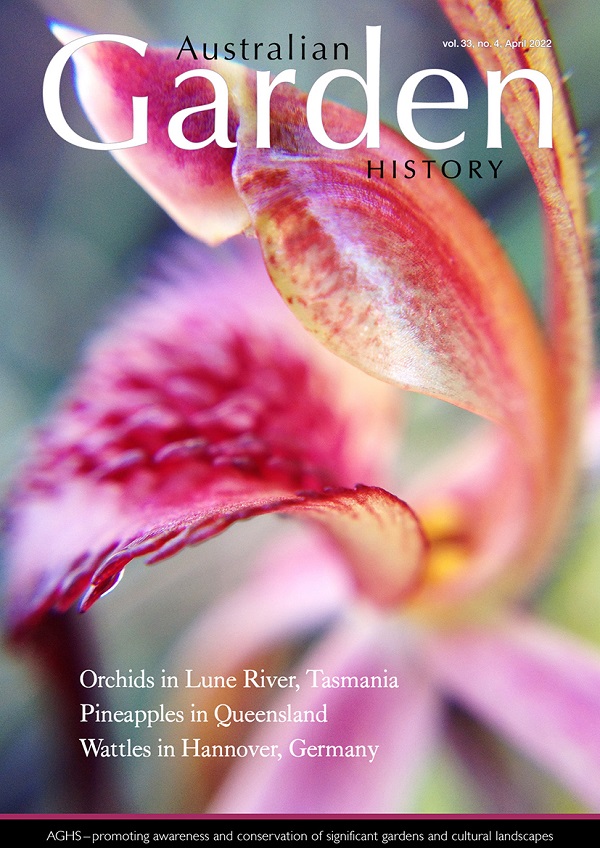
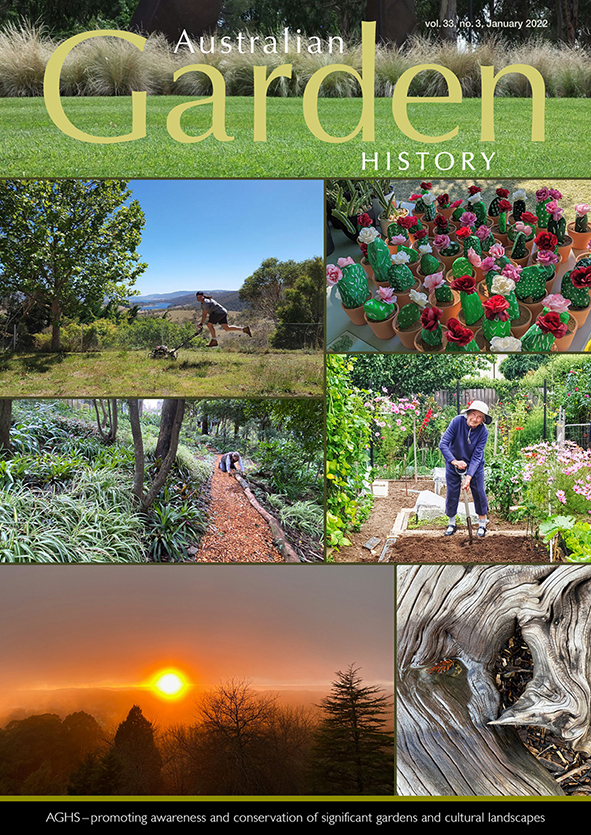
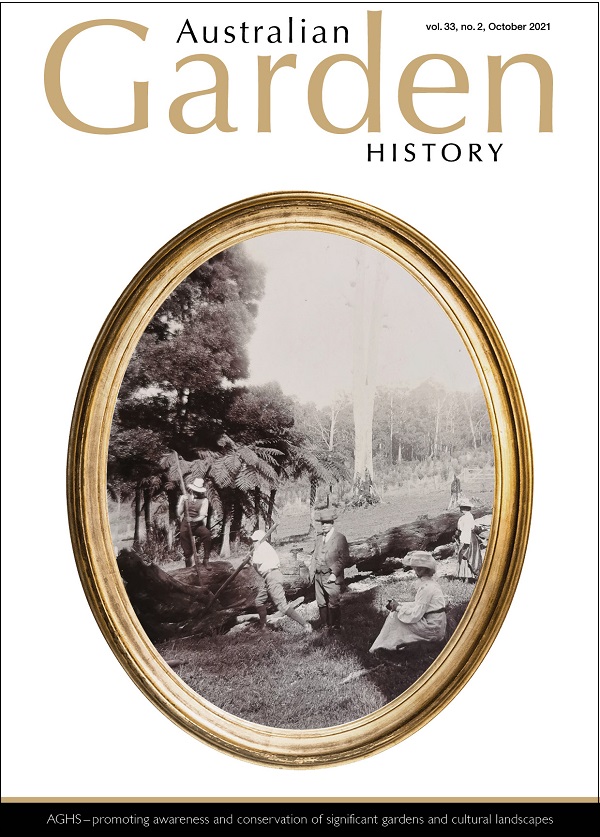
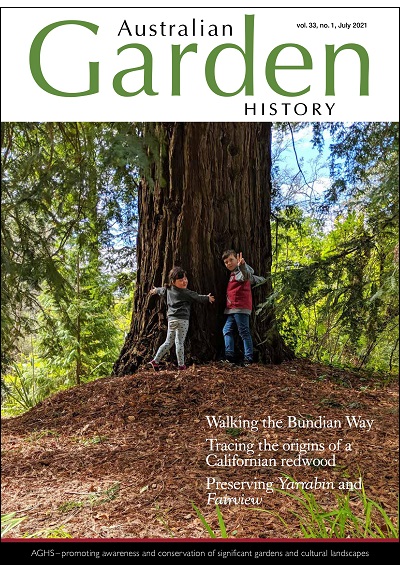
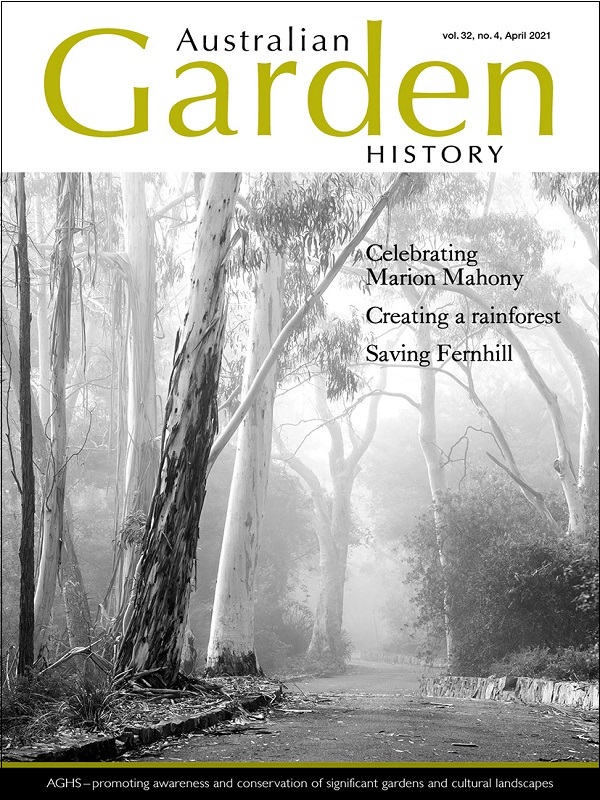
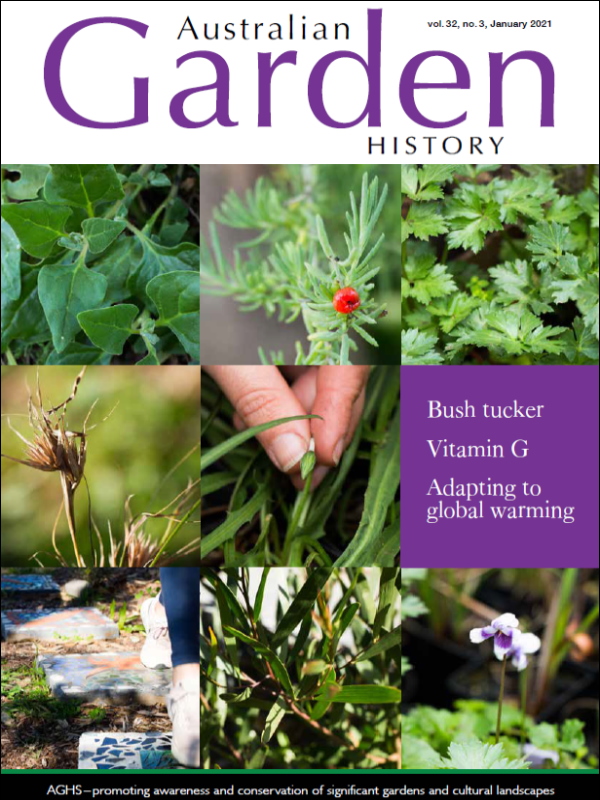
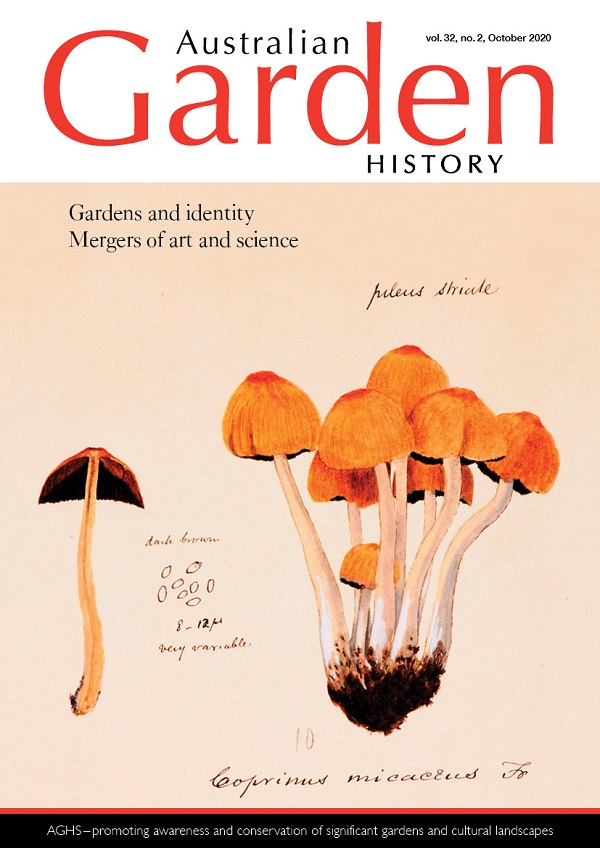
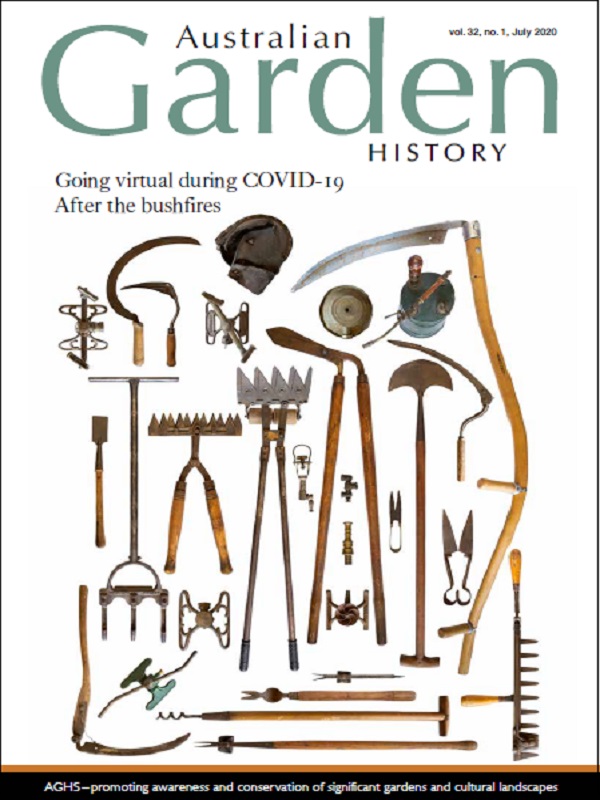
This Season
AGH Vol. 36 No. 4 April 2025
Contents
Uninnocent landscapes: Following George Augustus Robinson’s Big River Mission Ian Terry
George Augustus Robinson is a controversial figure in Tasmania’s colonial history. The author retraced routes of Robinson’s so-called Big River Mission, often recognised as ending Palawa resistance.
Bringing the landscape in: Cootamundra gardens over the years Sherryn Datoo
In November 2024, a tour organised by the ACT Monaro Riverina Branch visited the large country gardens at Bramshott, Rose Vale and Ferndale in the Cootamundra area. Each of the gardens visited has its own personality and unique spaces for the families who live there, although all cleverly incorporate the surrounding countryside.
Beautifying inner-city Brisbane: The legacy of Alexander Jolly Andrew Kidd Fraser
Brisbane is a hilly city with a large number of roads cutting through hills, leading to what are mostly bare stone embankments built into the slopes. One section of the city stands out – the area to the immediate west of the CBD that encompasses what are now the suburbs of Paddington, Bardon and Ashgrove – where the stone embankments of a hundred years ago did not remain unadorned stone but were planted with gardens, many of which exist to this day. As city gardener for Ithaca City Council during those years, Alexander Jolly played a significant role in the appearance of the area.
Horticulture and healing: The gardens at Kenmore Claire Baddeley
In July 1894, a ‘Hospital for the Insane’ opened at the Kenmore Estate, near Goulburn, NSW. The layout of Kenmore’s gardens exemplified the prevailing view that designed landscapes were important in the therapeutic management of mental illness. These open spaces were a means of therapy: places for the relief of pain where human emotions and morality could be united through nature.
The dating game: Date palm, Phoenix dactylifera Dot Evans
Genetic evidence shows the date palm was first domesticated in the Persian Gulf more than 6,000 years ago. Date farming in Australia is in its infancy. Date farms have been established at Limestone Bore, NT, and Gurra Downs in the South Australian Riverland.
A sanctuary in the southern Peloponnese: The Leigh Fermor house and garden Trisha Dixon
The Leigh Fermor house and garden at Kardamyli, Greece, have a purity that comes from keeping true to the Greek landscape.
Vale Glenn Cooke John Taylor
Glenn Cooke, a long time and much-loved member of the AGHS, was actively involved in the workings of the Society over three decades, including being Chair of the Queensland Branch of AGHS, Vice Chair of the National Management Committee and a member of the Editorial Advisory Committee.
For the bookshelf: The Fairer Side of Buxton by Clare Gleeson. Reviewed by Lynne Walker
Alfred Buxton (1872–1850) was the first landscape designer in New Zealand. Gleeson has done a fine job of ying the history of Buxton gardens together with that of New Zealand gardening overall.
For the bookshelf: The Garden Against Time: In search of a common paradise by Olivia Laing. Reviewed by Anne Claoue-Long
This is an enchanting love letter to gardening and plants as Laing recounts uncovering an established but overgrown historic garden at a new home in Suffolk, England, and restoring the garden to its former glory.
Remarkable gardens: Michael Perry Botanic Reserve Mark Ellis and Susan Marsden
On the banks of this tributary of the River Torrens, Michael Perry Botanic Reserve is an oasis of calm, with magnificent exotic and native trees towering over the valley. Newly restored indigenous vegetation along the creek and on the adjacent hillside is a haven for local wildlife. The core of the garden revives the character of the 19th-century garden established along Second Creek.
Good news: Speaking of gardens Patsy Vizents
The interviews in the AGHS’s National Oral History Collection are usually locally focussed but are also nationally relevant: they cast light on our rapidly changing times. The AGHS’s oral histories constitute a huge volume of collected memories and rich information about the Society and garden history more broadly.
AGHS national oral history collection: Miranda Morris-Nunn
Miranda Morris-Nunn recounts how she first became involved with the Garden History Society and of being involved with the early movement to protect historical gardens in Tasmania.
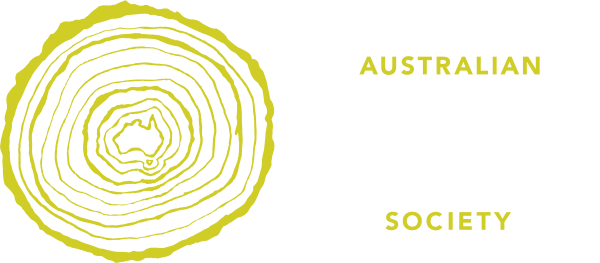
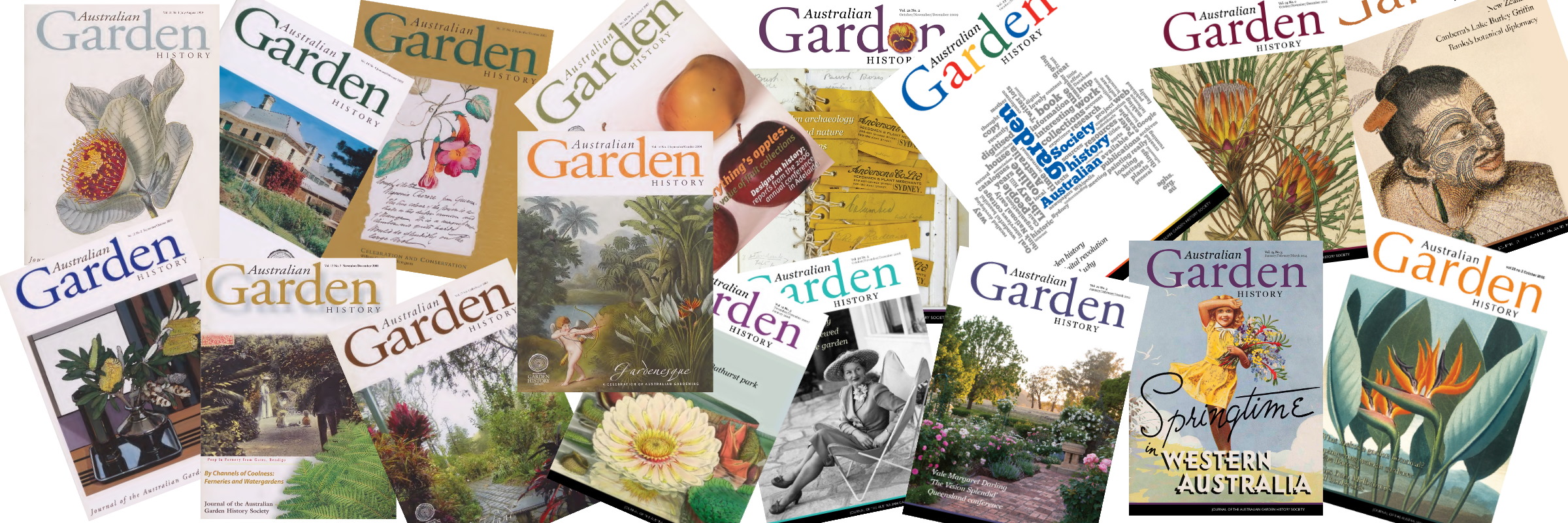
Leave a Reply
You must be logged in as a member to post a comment.